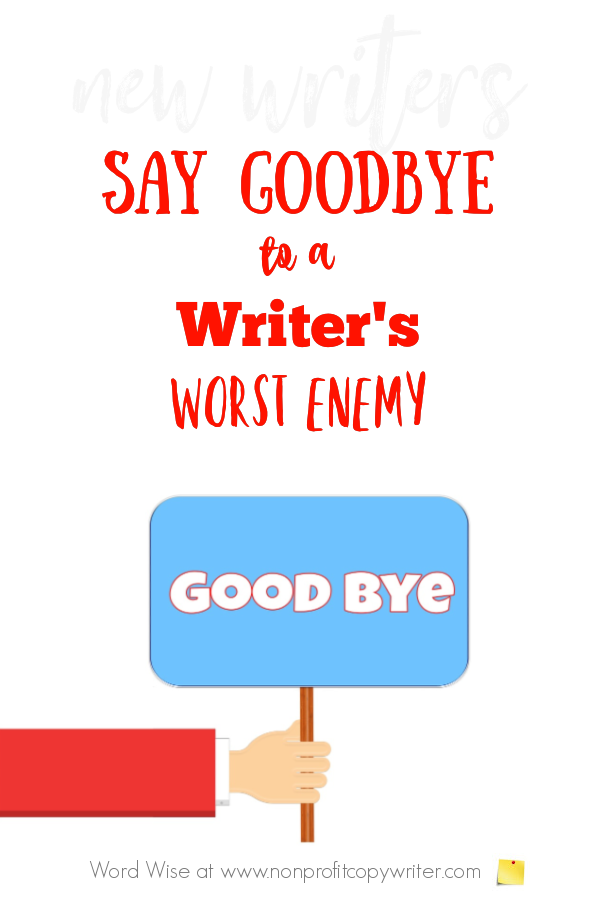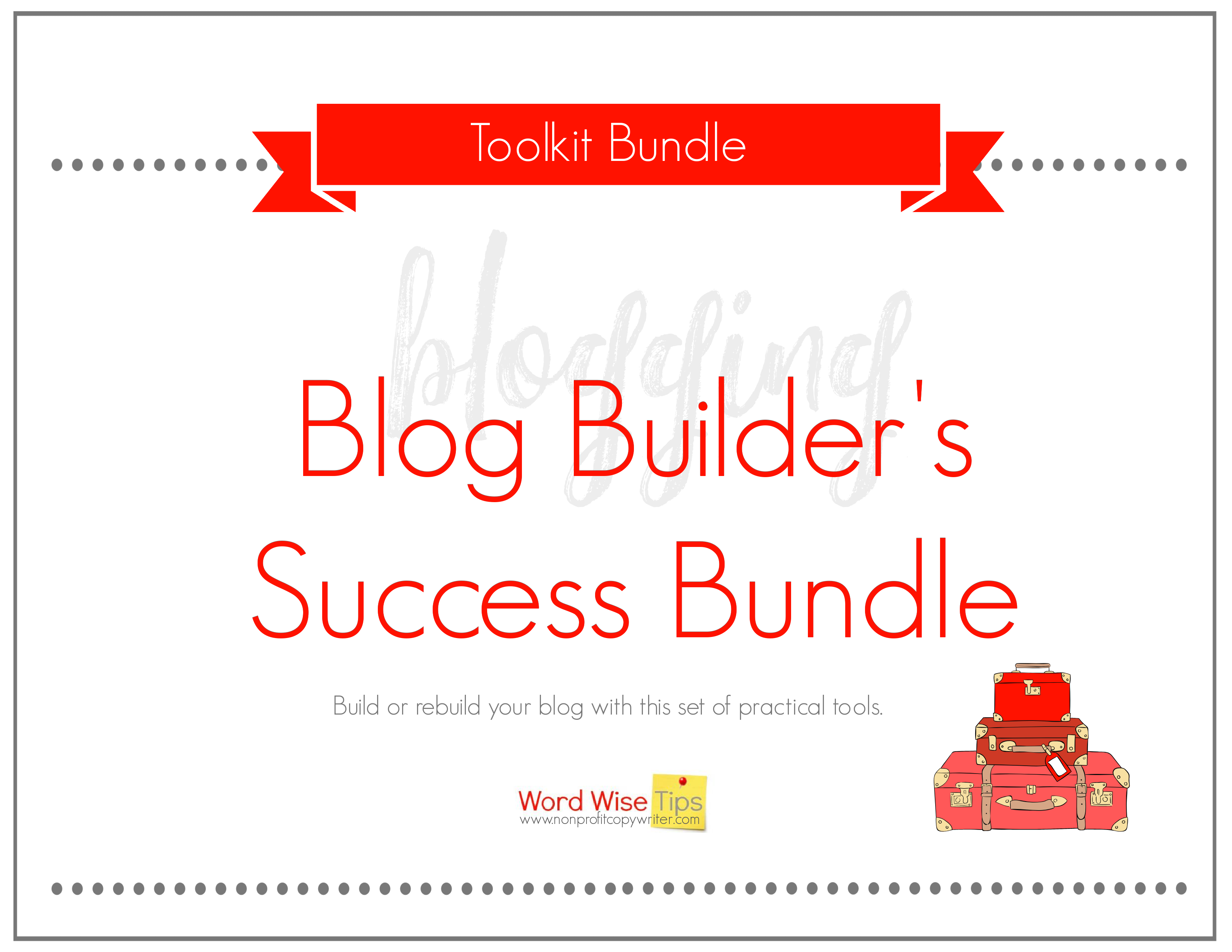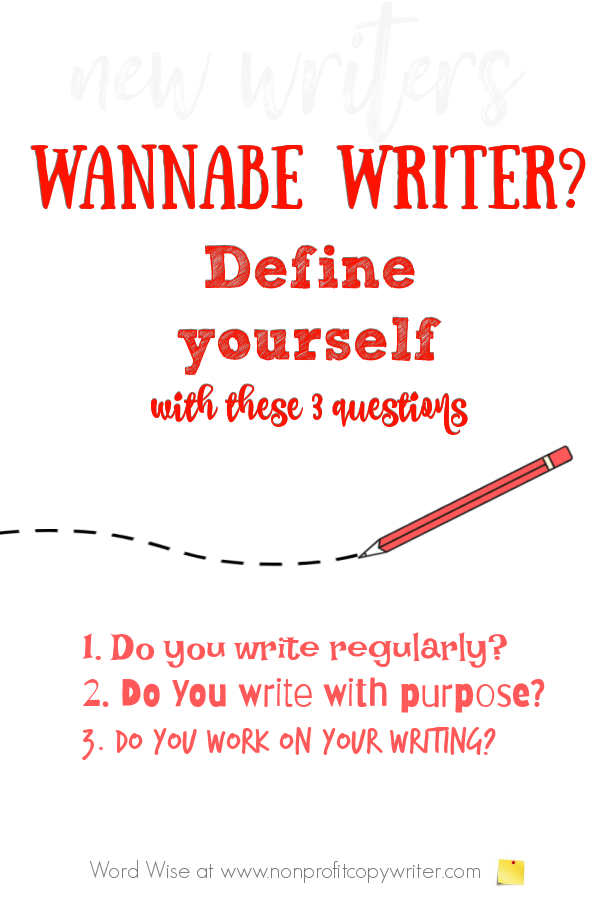
Wannabe Writer? Say Goodbye to Your Worst Enemy
Award-winning writer Kathy Widenhouse has helped hundreds of nonprofits and writers produce successful content and has gained 600K+ views for her writing tutorials. She is the author of 9 books. See more of Kathy’s content here.
Posted 11.16.24
“Where have you submitted your content?” That’s the question I posted to the writers in my Facebook writers’ group.
I expected members to list all kinds of markets. But the responses shocked me.
- “I don’t know where to find someone who’d want to read my stuff. I’m just a wannabe writer.”
- “I haven’t submitted anything. I don’t think of myself as a writer yet and don’t think my content is good enough.”
- “I’m waiting until I’ve edited this piece just one more time. Then I’ll feel like a real writer.”
These precious, up-and-coming writers feel like they’re in a battle. In reality, they are sabotaging themselves. Are you, too?
Writers do not have these 4 enemies
If you’re an aspiring writer, you have enemies. I’ll get to them in a minute. But first, you should know that your enemies are not …
- Editors and publishers. Pros want to find talented writers with solid skills. They make a living from working with people like you, shaping your content to fit their publications and appeal to their readers.
- AI. It’s not a competitor. It’s a tool. One or two swipes through ChatGPT can help you create an article outline. But it can’t infuse your content with personality and powerful stories.
- Other writers. They’re your colleagues, not your challengers. Plus, these folks are generous. They put their how-to information out there for you to learn from, much of it for free. And they understand the demons you face.
- Readers. Even when readers feel like fault-finders rather than fans — and lob criticism your way — remember this: they had to read your content first. That means you’ve been heard.
Writers do have a few enemies
Yes, you’ve got enemies. Most of them are within. But these enemies are not the worst you can face … and you can disable them with a bit of know-how.
Fear
Maybe you call it self-doubt, lack of confidence, or the Imposter Syndrome. You question your skills and have nightmares about being exposed as a phony, even when evidence suggests otherwise.
If that’s you, then welcome to the writing world. Every writer feels like a fraud. It goes with the territory. Just ask Agatha Christie, the best-selling novelist in history. Or American poet laureate Maya Angelou or top blogger Seth Godin.
Perfectionism
You fight to make every sentence perfect. Good for you — rewriting is what makes a good writer even better.
You can learn to manage perfectionism by setting a few calendar deadlines. A time limit puts a limit on your crippling tendency to think you must be faultless.
Distraction
You get pulled to and fro by interruptions … email … planning … research … writer’s block. You mistakenly believe that the latest tool will propel you to success, so you end up with a computer chock full of courses, apps, and eBooks. Good news: you can fight distraction with the dozens of productivity tools available today. Choose one. Use it.
Build your blog with this set of printable, reusable tools.
A wannabe writer’s biggest enemy
Fear, perfectionism, distractions — they’re worthy opponents. I’m not minimizing the challenge they place on your plate. But each is simply a by-product of your underlying nemesis.
Your biggest enemy is what you call yourself: a wannabe writer.
You may use variations like, “writer-in-training” or “aspiring writer.” Or maybe you say, “I’m just learning to write” or “I’m not a writer yet.”
Why is this self-label so devastating?
Your view of yourself determines everything, explains celebrated psychologist Carol S. Dweck, Ph.D. Individuals who believe their talents can be developed (through hard work, good strategies, and input from others) have a growth mindset. But those with a fixed mindset live by the principle that their talents are innate gifts bestowed at birth and come in a rationed quantity.
- A “wannabe writer” has a fixed mindset. If you believe your abilities have a quantifiable limit, you will prove yourself correct over and over rather than learning from your mistakes. In other words, you falsely believe that writers are born, not made … there is only so much success to go around … you didn’t receive a decent portion.
- A “writer” has a growth mindset — no matter his current stage or ability level. “The passion for stretching yourself and sticking to it, even (or especially) when it’s not going well, is the hallmark of the growth mindset,” says Dweck. “This is the mindset that allows people to thrive during some of the most challenging times in their lives.”
And you’ll face those times: your umpteenth rejection letter. Your struggle to eke out time to write. Your effort to land a client. Your rock-bottom number of followers. Or your 500-word-per-day goal.
The truth about you, dear writer
A writer’s growth mindset is not just about being flexible or open-minded. It’s not even about putting in the effort. Nor is a growth mindset simply a positive attitude that channels The Little Engine That Could’s “I think I can, I think I can.”
A growth mindset is grounded in truth.
- Truth: you’re not “just learning to write” — like the member of my writing group claimed. You went through that ordeal when you were six or seven years old. Maybe you’re learning to write better or write different forms of content or write in a conversational tone. Guess what? So is every writer I know.
- Truth: outside recognition doesn’t make you legitimate. You don’t need to be published, paid, or reviewed to be labeled as a writer. Anna Burns relied on her local food bank to survive while she wrote her Booker Prize-winning work, Milkman. The subsequent recognition made paying her bills much easier. But the prize did not confer on her the title of “writer.” She was a writer already — one that subsequently won a prize.
- Truth: growth is possible. Growth simply means you’re making progress.
Give yourself a new name
How do you cross the line from calling yourself a “wannabe writer” and adopt the “writer” moniker? Ask yourself these questions.
- Do you write regularly? If so, it means scribbles and typing are not a one-shot deal for you. Journaling, essays, stories, blogs — even writing technical content or reports at work — qualify you as a writer. You may not write every day, but you write often — even habitually.
- Do you write with a purpose? You share ideas, entertain, inform, persuade — through words — in whatever kind of content you create.
- Do you work on your writing? This is you if you take the time to improve your writing skills through learning, studying, editing, or getting feedback. You read — a lot. You find yourself mentally editing others’ content as in, He should have opened with a stronger hook or Yikes, that was a wordy sentence.
If you answer yes to those three questions, then throw out your “wannabe writer” label. Face the truth. It’s time for an attitude adjustment and a new name.
- You show up at the keyboard — often.
- You write with a purpose, even just to record your thoughts.
- You constantly hone your craft.
Put those characteristics together, and you’ve got a growth mindset. You keep creating content and it keeps getting better. It doesn’t matter if you have a gazillion followers or none. And it doesn’t matter if you get paid for your words or you don’t.
Don’t fall for the biggest mistake in the book — buying into an attitude that limits you. Look at the facts. Then choose to grow as long as you have breath in your body.
Ditch the “aspiring writer” label. You’re not a wannabe. You’re a writer.
More about The Writing Life
Don't Market Your Writing. Do This Instead.
Get Cured of The Imposter Syndrome ...
The Shiny Object Syndrome for Writers ...
5 Ways to Become a Better Writer. ..
Bust These 3 Myths about Finding Time to Write ...
Don’t Finish Writing – and Get More Done ...
7 Streams of Income for Writers ...
How To Write Faster: Use Bursts AND Binges ...
More Writing Tips on our Pinterest board ...
Return from Wannabe Writer? to Nonprofit Copywriter home
As an Amazon Associate I earn from qualifying purchases.
Search This Site
Share This Page

Named to 2022 Writer's Digest list
BEST GENRE/NICHE WRITING WEBSITE


Stop Wasting Time!

Grab your exclusive FREE guide, "5 Simple Writing Tips You Can Put to Use in 10 Minutes or Less"











